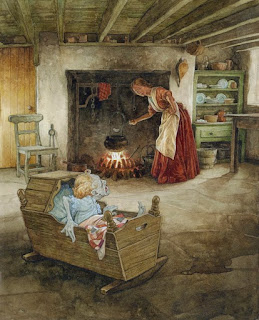Reading Notes: Celtic Fairy Tales, Part B - Brewery of Eggshells
Brewery of Eggshells
Unlike the last story I took notes on for this unit, this story does not really remind me of any of the classic fairy-tales-turned-Disney-movies that we all know and love. In this story, a woman leaves her newborn twins alone in her house while being called away to a neighbor's house, and when she comes back, all appears normal, but the truth is that everything has changed. She noticed some elves crossing her path as she came back, even though it was midday (I guess elves don't come out at night), and as time went on everybody around noticed that the woman's twins had not grown at all. She was upset by this, so she went to see a wise man to get some advice. He told her to prepare some pottage in eggshells, as if to prepare a meal for the threshers working in the fields, and to wait and see if her children said something that kids shouldn't have the awareness to say. If they did, she was to throw them in the lake, and if not, they were truly her kids, and she had to leave them alone. As the woman comes in with the pottage and her eggshells, she hears the kids remark that it's weird for someone to serve stew in eggshells, and she knows then that her kids have been replaced by dwarves. She takes them and throws them in the lake, and the other elves come out to save their kind, and the woman gets her children back.
 |
| An Irish depiction of a changeling (Source: The North Clare Local) |
So, this is obviously not like most common fairy tales, but I think this kind of story is familiar in terms of the lore surrounding elves of different cultures. The idea of stealing children and replacing them with their own kind, called changelings, is pretty common in a lot of different folklore. This is an interesting way to expose them, because you just do something weird and see if they say anything about it. I have always found the changeling literature kind of interesting, and it was cool to get a Welsh take on these kinds of stories.
Story Source: Celtic Fairy Tales by Joseph Jacobs with illustrations by John D. Batten (1892).



Comments
Post a Comment